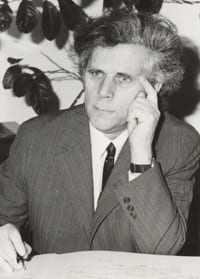Leoncjusz Ciuciura, an ardent advocate for contemporary music and co-organizer of the Polish Chapter of Jeunesses Musicales International, died on February 28. He was 86 years old.
Born 22 June 1930 in Grodzisk Mazowiecki, Ciuciura studied composition with Tadeusz Szeligowski in Warsaw during the years 1954-1960. Laureate of numerous prizes, Ciuciura’s early works from the 1960s (Suita warmińsko-mazurska, Canti al fresco, Concertino da camera, and Ornamenti) were recognized by the Ministry of Culture and Arts, Polish Composers’ Union, International Competition for Composers in Prague, and Fitelberg Competition in Katowice. In 1992 Ciuciura was recognized for his achievements in the field of contemporary music with the Medal of the 20th Century by the International Biographical Centre in Cambridge, England. In 2004, Ciuciura received an honorary title of Great Mind of the 21st Century from the American Biographical Institute. His compositions were performed at various festivals, including Warszawska Jesień, ISCM World Music Days, and in concerts all across Europe and the U.S.
A member of the Polish Authors’ Society, ZAiKS, from 1962, many of Ciuciura’s compositions combined elements of improvisation, linking music and pantomime, dance, theatre and other forms of art. A firm believer in the “self-improvement” of his compositions, Ciuciura argued that:
Since 1964 until the present, each performance [of my work] is a world premiere and therefore the date of that performance should be changed and updated accordingly. Beginning with my Spirale per uno e piu’ I have launched my own concept of musical form, a spiral form, where the starting point could be visual graphics, sonorist elements, prepared sounds, as well as minimal music, Momentformen, collage, happening, conceptualism, etc. Thanks to the elements of expectation, virtual reality and eschatology, this new, spiral form of a musical composition opens the door to self-realization, self-discovery and self-improvement.
Ciuciura’s deeply idealistic credo can be found in a statement attached to his cycle Creatoria, begun in 1963 and continued for several decades thereafter:
Creatoria are based on dreams of a war-free universe where there is no discrimination of viewpoints and no racial discrimination, a world where there is no hunger and no poverty, nor is there destruction of the environment. They are inspired by the desire for social justice, where freedom of the individual, brotherhood and solidarity of mankind represent basic values. I believe and try to express in my compositions that music also—to a degree—could help to improve the world and, just like science, can discover universal laws that unite all elements of reality. The music does inspire and integrate; it enlivens the spiritual energy and not only links two human beings with each other but also connects with the surrounding world and the entire cosmos. There is no division between performers and audiences in my works. There is only a homo creator, a sensitive being syntonically attuned and open minded, with great imagination and an accommodating character, who is also open to new intellectual and aesthetic discoveries.
Over the past two decades, Leoncjusz Ciuciura had generously donated several of his scores to the PMC library, including Rencontre I per uno e piu’ for any set of instruments, Intarsio II for any set of instruments, as well as his cycles Creatoria I and Creatoria II for any set of instruments.
[Sources: polmic.pl, zaiks.org.pl]
